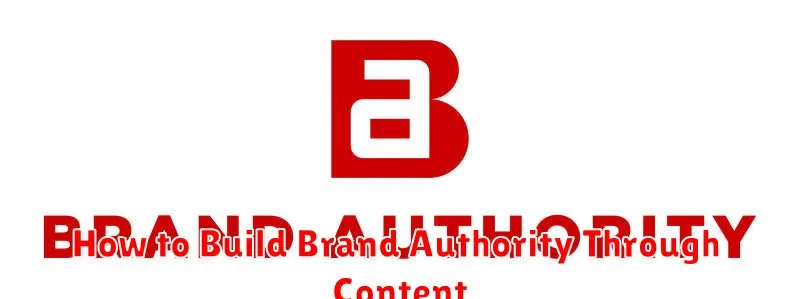In today’s competitive digital landscape, establishing brand authority is paramount to success. Building brand authority not only fosters trust and credibility with your target audience but also drives customer loyalty and ultimately, boosts revenue. Through strategic content creation, you can position your brand as a thought leader in your industry, attracting and retaining customers who value your expertise. This article explores actionable strategies for how to build brand authority through content, covering key elements like identifying your niche, understanding your audience, and crafting high-quality, valuable content.
Building brand authority through content requires a comprehensive approach, focusing on delivering consistent value and engaging with your audience. From crafting informative blog posts and in-depth articles to creating engaging videos and interactive social media content, the possibilities are vast. By consistently providing valuable, informative, and engaging content, you can cultivate a strong online presence, establish your brand as a trusted source of information, and effectively build brand authority in your industry. Discover how to leverage the power of content to elevate your brand and establish lasting authority in the market.
What Is Brand Authority?
Brand authority refers to the credibility and trustworthiness a brand has established within its industry. A brand with high authority is seen as a leader and expert, often influencing consumer purchasing decisions and shaping industry trends.
This authority isn’t built overnight. It’s earned through consistently providing valuable information, demonstrating expertise, and building a positive reputation. Customers trust authoritative brands, believing in their products or services and their ability to deliver on their promises.
High brand authority translates to several tangible benefits, including increased customer loyalty, higher conversion rates, and stronger organic search visibility. It positions your brand as the go-to resource in your niche, fostering trust and attracting new customers.
Why Content Is the Key
Content serves as the foundation for establishing brand authority. It provides the means to showcase expertise, build trust, and engage with your target audience. Through valuable and consistent content, you demonstrate a deep understanding of your industry, addressing the needs and pain points of your customers.
Effective content allows you to control the narrative surrounding your brand. By providing informative and insightful resources, you position yourself as a thought leader, shaping perceptions and influencing purchasing decisions. This ultimately strengthens brand reputation and drives business growth.
High-quality content also enhances your online visibility. Search engines prioritize valuable content, leading to improved organic search rankings and increased website traffic. By optimizing content with relevant keywords and providing valuable information, you attract a larger audience and establish a stronger online presence.
Choosing the Right Topics

Selecting appropriate content topics is crucial for building brand authority. Focus on subjects directly related to your products or services. This establishes your expertise within your industry niche.
Consider your target audience’s needs and pain points. Addressing their challenges through informative and helpful content positions you as a valuable resource.
Keyword research is essential. Identify the terms your audience uses when searching for information related to your industry. Incorporating these keywords into your content improves search engine visibility and attracts the right audience.
Explore trending topics within your industry. Staying current allows you to provide fresh perspectives and demonstrate thought leadership. Monitor industry publications, social media, and online forums to identify emerging trends.
Don’t be afraid to delve into niche topics within your broader industry. This allows you to target a specific segment of your audience and establish specialized expertise.
Using Expert Opinions
Leveraging expert opinions is a powerful way to build brand authority. By associating your brand with recognized leaders in your industry, you instantly gain credibility and build trust with your audience. Expert insights lend weight to your content and position your brand as a valuable resource within your niche.
There are several ways to incorporate expert opinions. You can conduct interviews and feature them in blog posts or podcasts. Quotes from industry leaders can be strategically woven into your articles or social media posts. Hosting webinars or online events with expert panelists also provides a platform to showcase their knowledge while associating your brand with their authority.
When selecting experts, ensure their expertise aligns with your brand values and target audience. Clearly attribute their contributions and maintain ethical practices throughout the collaboration. By strategically showcasing expert perspectives, you elevate your content and solidify your brand’s position as a thought leader in your industry.
Consistency Across Platforms
Maintaining a consistent brand presence across all platforms is crucial for building authority. This includes using the same logo, color scheme, typography, and brand voice across your website, social media profiles, and any other online presence. Consistency creates a unified brand experience, making it easier for your audience to recognize and remember you.
Consider developing a brand style guide to ensure consistency. This document should outline all aspects of your brand’s visual and written identity. It acts as a reference point for anyone creating content for your brand, ensuring a cohesive message regardless of the platform.
Consistent messaging is equally important. While the format of content might vary across platforms (e.g., short-form videos on TikTok vs. long-form blog posts on your website), the core message should remain the same. This reinforces your expertise and builds trust with your audience.
SEO and Credibility
Search engine optimization (SEO) plays a crucial role in establishing brand authority. Visibility in search results is often the first impression a potential customer has of your brand. Higher rankings suggest expertise and trustworthiness, immediately boosting credibility.
Keyword research is essential. By understanding what your target audience searches for, you can create content that directly addresses their needs and questions. This not only improves SEO but also positions your brand as a valuable resource.
On-page optimization, including title tags, meta descriptions, and header tags, further enhances search visibility. Well-optimized content makes it easier for search engines to understand and index your content, leading to higher rankings and increased organic traffic.
High-quality, relevant content is paramount. Content that provides genuine value and accurately answers user queries builds trust and reinforces authority. This, in turn, signals to search engines that your website is a reliable source of information, further boosting your rankings.
Long-Form vs Short-Form Balance
Finding the right balance between long-form and short-form content is crucial for building brand authority. Both serve distinct purposes and cater to different audience needs and consumption habits.
Long-form content (generally 1,200+ words) allows for in-depth exploration of complex topics, demonstrating subject matter expertise and boosting your SEO rankings. It provides valuable, comprehensive information that positions your brand as a trusted resource. Think white papers, ebooks, and detailed blog posts.
Short-form content (typically under 1,200 words) is ideal for capturing attention quickly and driving engagement on social media. It’s easily digestible and perfect for sharing quick tips, updates, and behind-the-scenes glimpses. Examples include social media posts, infographics, and short videos.
The optimal balance depends on your specific target audience and business goals. A content calendar should strategically incorporate both formats to maximize reach and impact. Analyze your audience’s preferences and experiment to determine what resonates best.
Leveraging Case Studies
Case studies are a powerful tool for building brand authority. They provide tangible proof of your expertise and capabilities by showcasing successful client projects. A well-crafted case study demonstrates how your product or service solved a specific problem for a client, leading to measurable positive outcomes.
Focus on highlighting the challenges faced by the client, the solutions you implemented, and the results achieved. Quantify the impact whenever possible, using metrics and data to demonstrate the value you delivered. For example, instead of saying “improved website traffic,” state “increased website traffic by 25%.” This data-driven approach adds credibility and strengthens your authority.
Structure your case studies logically, using clear headings and concise language. Consider incorporating visuals like charts and graphs to present data effectively. By showcasing your successes through compelling narratives and quantifiable results, you establish yourself as a trusted leader in your industry.
Collaborating with Influencers
Influencer marketing can significantly boost your brand’s authority. By partnering with relevant influencers, you can tap into their established audience and credibility.
When choosing influencers, prioritize authenticity and relevance over sheer follower count. An influencer who genuinely aligns with your brand values and target audience will yield better results than one with a larger but less engaged following.
Transparency is crucial. Clearly disclose any sponsored content to maintain trust with both the influencer’s audience and your own. Regulations mandate disclosure, and ethical practices demand it.
Measurable goals are essential for any influencer campaign. Determine the key performance indicators (KPIs) you want to track, such as website traffic, brand mentions, or sales conversions, to assess the effectiveness of your collaboration.
Promoting Trust and Transparency
Trust and transparency are crucial for building brand authority. When your audience believes in your brand and its values, they are more likely to see you as an authoritative source.
Openly share your processes and be honest about your limitations. Don’t be afraid to admit when you’ve made a mistake. Addressing challenges directly shows authenticity and builds stronger connections with your audience.
Transparency extends to your content creation process. Clearly cite sources, disclose any sponsored content, and avoid misleading language. This fosters trust and reinforces your commitment to ethical practices.
Building trust takes time. Consistently delivering valuable, accurate, and honest content will demonstrate your expertise and build a loyal following who recognize your brand as an authority in your industry.

